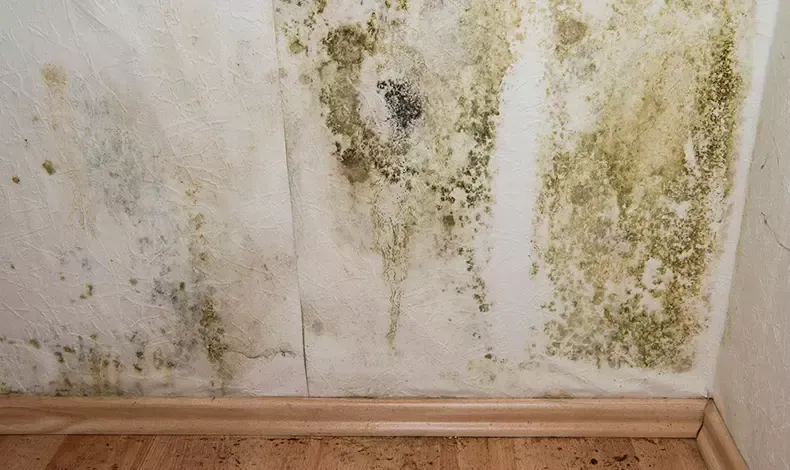From plumbing leaks, septic tanks, or sewage backups to large-scale natural disasters, water damage can jeopardize your health if you don't deal with it immediately. Long-term water damage may lead to weakened structures, unpleasant odors--an indicator of mold and mildew growth, poor indoor air quality, and toxic mold growth that creates long-term health risks.
We'll look at the kind of flooding that creates a high-risk environment and how you can restore a healthy environment to your home or office if you happen to find yourself up an indoor creek without a paddle. Looking to read up on a specific topic? Use our index below and jump to the information you need.
- Plumbing Problems - Dirty Water Flooding
- Flooding and Black Water
- Mold Growth and Disease
- Long-term Issues
- Be Prepared
- Other Resources
Plumbing Problems – Dirty Water Flooding
Whether it's an overflowing toilet or a blockage at the mains creating a foul-smelling back-up, a dirty water flood in your home requires immediate attention to prevent water damage and severe health risks.
Safety first: wear long pants and sleeves, rubber boots, gloves, goggles, and a respirator mask. Clean up the area of filth and water as quickly as possible. If there is a back-up on the street or in the city sewer system, you will need a professional to stem the flow and clear the affected area.
A heavy-duty water pump, flood-pumper vacuum, or industrial wet vacuum is the most effective way to eliminate a large amount of standing water. Special water damage restoration air movers are used to dry affected spaces quickly and thoroughly.
After the area is dry, be sure to clean and disinfect to destroy fungi, bacteria, and viruses. You can use a disinfectant like Dri-Eaz Milgo Plus Disinfectant or a vapor steam cleaner.
Flooding and Black Water
Floodwater or black water is the most dangerous kind to have in your home. It may contain raw sewage, chemical waste, and infectious microbes. Stay away from standing flood water whenever possible. If you come into contact with it, immediately wash affected areas with soap and hot water.
You may have had to evacuate in case of a storm or flash flood, but as soon as possible, remove standing flood water from your home. You may need to call a professional who can use water pumps, extractors, air movers, and dehumidifiers to eliminate all water, including hidden moisture.
If you are tackling this job on your own, wear protective gear and then use an EPA-registered chemical disinfectant to sanitize the area after it's dry. Afterward, it may be a good idea to set up an air purifier to continue to clean and circulate the air.
Mold Growth and Disease
Floodwater is notorious for causing mold growth, which has been implicated in several cases of “sick building syndrome.“ Even when the area has been cleared of visible water, many times the floor, walls, and floor coverings hold onto trapped moisture long after the flood.
In these conditions, mold can take hold and spread quickly, growing on ceiling tiles, wood, and paper products; as well as paint and wallpaper, insulation, drywall, carpets, upholstery, and even dust.
Short-term exposure may cause allergic reactions, sinus congestion, and irritations of the eyes, nose, and throat. If you're sensitive to mold, you may experience a more severe reaction, including fever and shortness of breath.
Long-term Issues
What happens if floodwater contamination is not dealt with immediately and thoroughly? Mold and other water-borne bacteria can continue to grow, causing long-term health issues, including asthma, and life-threatening primary and secondary infections in immune-compromised individuals.
The infamous “Katrina Cough“ popped up after widespread flooding caused by Hurricane Katrina. Because of a high level of mold spores and other contaminants in the air, this respiratory illness spread rapidly among the residents of New Orleans.
Toxic mold is a more serious cause for concern, and often grows in flood-damaged areas that have not been properly cleaned and disinfected.
Molds like Stachybotrys chartarum and Aspergillus Niger produce toxins known as mycotoxins. Mycotoxins may cause an array of health problems, with long-term effects that can include memory loss, insomnia, anxiety, depression, inability to concentrate, and confusion.
Be Prepared
It's much easier to deal with a flood when you're prepared. If you live in a flood-prone area, you may want to invest in some basic water damage restoration equipment. After the fact, it may be too late to buy or rent the equipment you need to prevent irreversible water damage or alleviate unhealthy living conditions.
If you live in a FEMA-designated VZone (special flood hazard area) it's also a good idea to buy flood insurance, even if you no longer have a mortgage and are not required to have it.
When you prepare for a flood, you have a much better chance of quickly applying remediation techniques, thereby reducing water damage and the chance of associated illnesses.
Other Resources
For additional information and assistance in dealing with a flood, the EPA website has documents and links that can help. The CDC website (Centers for Disease Control and Prevention) also has good information about mold clean-up, including cleanup after a flood.
You can also use these links to access the Sylvane website for a wide range of air movers, commercial dehumidifiers, flood pumps, and other equipment for water damage restoration professionals and homeowners who need a few basic equipment.
- Water Damage Dehumidifiers
- Water Damage Air Movers
- Mold Detection
- Remediation Chemicals & Disinfectants
In Summary
Weather updates and warnings notwithstanding, dirty or black water-flooding is almost always unexpected and can be devastating, no matter how minor. Being prepared helps, and that can include flood insurance, contact information of remediation professionals, and owning a few pieces of standard water damage equipment which can help you more quickly recover property and prevent health issues.


